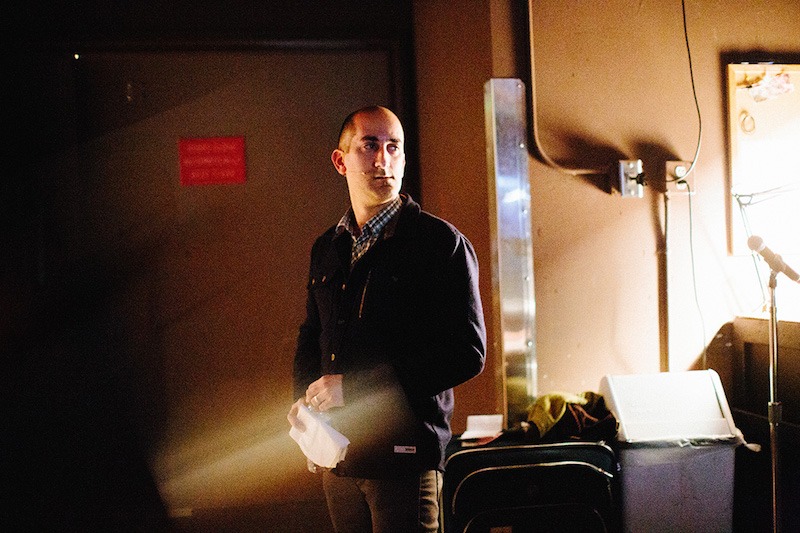
Neanderthals, bipedal black bears, lesbian albatrosses, and wallets returned to their owners after being lost for decades: the cornucopia of subjects tackled by Jon Mooallem are matched only by their quirkiness.
The New York Times Magazine contributing writer’s work has run in publications like California Sunday Magazine, Slate, and ESPN The Magazine, and in podcasts including This American Life and 99% Invisible.
A Colorado College alum and 2006 graduate of the UC Berkeley Graduate School of Journalism, Mooallem developed his eye for unique stories and angles in part from the need to find fresh takes on heavily covered topics. Early in his career, he felt like a journalism outsider, thinking “there’s no way I can compete on actual” news stories.
Mooallem’s quick ascent to some of the country’s most prestigious journalistic organizations started with The Hudson Review in New York, where he sifted—drearily, he recalled—through its poetry slush pile. The opportunity to read through outside magazines the literary journal kept on hand—especially Harper’s Magazine—disclosed a whole new world of writing.
“I could spend my life being one of these people sitting in their house, writing poems, and then submitting them to little magazines,” he said, “or I could be one of these magazine guys, and go out in the world, and into these weird situations, and write about them.”
After leaving The Hudson Review and freelancing for a bit, the New Jersey native packed up and headed west to California, applying to the J-School almost on a lark since he planned to be in the area. He could see his career path ahead of him, but was “blustering my way through it.” Berkeley, he mused, could help with that.
While continuing to freelance as a student, Mooallem said he used North Gate Hall as a safe zone to ask the “dumb” questions he didn’t want to pose to his editors. It was also an opportunity to compile a “mental database” of storytelling tips from professors and speakers.
Chief among his most inspirational teachers was his J200 instructor, Rob Gunnison, who made Mooallem’s first forays into hard-news reporting “feel fun, instead of scary.” After Mooallem discovered that the backers of a San Francisco ballot initiative had spent money “in a hypocritical way,” the head of the campaign “got huffy” with him over the phone.
“I initially felt flattened—I’m not a confrontational person—but Rob slapped me on the back and seemed impressed,” he wrote in an email. “I sometimes think about that, and still find it reassuring. And it still means a lot when he writes to compliment me on something I’ve written.”
Other mentors to whom Mooallem credited his journalistic development were Michael Pollan, Jack Hitt, and alum Rebecca Solnit (’84). “It was a preposterous gift to get to meet them so early on,” he said.
Animals are a common topic in Mooallem’s writing. His coverage of whooping cranes in a 2009 New York Times Magazine article led to more extensive reporting on the grisly realities of animal conservation and extinction. At the same time, he was watching his young daughter’s world overflow with the cheery, romanticized animal kingdom portrayed in cultural institutions like zoos and Disney films.
“When my daughter was born, it was like living in two worlds simultaneously,” he said of his perceptions of animals. Mooallem documented his exploration of that dichotomy in a 2013 book, “Wild Ones,” which was named a best book of 2013 by the New York Times Book Review and other national media outlets.
Whether it’s a dive into homosexuality in animals or a eulogy of sorts for Pedals, the bear that walked on two legs, the human experience is ever-present in Mooallem’s stories of fauna. But one of his most profound and challenging articles, he recalled, was a 2015 Times Magazine piece about long-time prisoners re-entering society.
“I had duped myself into thinking it would be something simple,” he said. Watching first-hand the confusion and intimidation inherent in something as simple as ordering food at a diner laid bare “all the richness and intensity of—it’s going to sound tacky—the human experience.” There are many folks sympathetic to ex-cons, he explained, but feeling a visceral empathy really requires being alongside them as they go through that daunting transition. Mooallem said he felt an intense pressure to get across an experience so “divorced from readers’ every-day reality.”
Mooallem, who now lives on Bainbridge Island near Seattle, plans to release a second book next year, this one examining the days following the Good Friday earthquake, which pummeled Anchorage, Alaska, in 1964. Also slated for eventual publication is a collection of magazine stories he has written over the years.
By Sam Goldman (’19)
Photograph by Jon Snyder, courtesy of Pop-Up Magazine
